It’s easy to get stuck in a conversation by just asking question upon question. And all you get is short one-word answers. It often ends up feeling more like an interview than a conversation.
It can feel so exhausting to carry that load in every conversation. In this guide, you’ll learn how to have a conversation without asking too many questions. Here are my best tips.
How to keep a conversation going without asking questions
You can use a compliment to keep a conversation going.
Here are some examples of compliments you can use early on in a conversation:
- “I love your watch!”
- “Your dog is so cute!”
- “That scarf matches your hair color so well!”
Read more about how to keep a conversation going over here.
The two main reasons why a conversation dies out
- One person doesn’t know what to say next. This could be due to nervousness, or because it feels like there’s nothing more to say.
- The conversation is not very interesting and one of you doesn’t feel like making conversation anymore.
1. How to make the other person know what to say
To make it easy for the other person to say something, you can ask a related question to your last statement. Don’t just ask a random question.
“Yes, it was great visiting France. (statement) What’s your favorite country? (related and open question)”
2. How to make the conversation more interesting by keeping it balanced
We are more interested in ourselves and our own lives and experiences than other people’s lives and experiences. This creates a problem when two individuals meet. They are both mainly interested in themselves.
A person will find a conversation interesting when they get to talk about something they can relate to. No matter how interesting you are and how many adventures you have been on, people will get bored if they can’t relate to what you’re saying.
As a rule of thumb, you and the person you are talking to should talk roughly half the time each.
If there are three people in the same conversion, everyone should talk one-third each, and so on.
Read more about how to make a conversation more interesting.
How to get to know someone by gravitating toward mutual interests
As soon as you have found something that you both like, make sure to talk more about it.
When two people feel similar enough, friendships will emerge.
To find mutual interests, you often need questions. But not just any question, you need to ask your questions with the purpose of finding out more. And base your questions off of clues you already got about what you might have in common.
Using questions with a purpose like this, you don’t get stuck just asking random questions. Each question gives you more information which takes you closer to your goal (a mutual interest).
How to start a conversation without asking a question
One trick I like is to use a positive statement instead of a question to get a conversation going. If I get a positive response to it, I know that the other person is open to a conversation.
Examples of making positive statements instead of questions to start a conversation:
- “Lovely weather today!”
- “That food looks amazing!”
- “Haha, look at that cute dog!”
You can practice making positive statements on your own. Just take a look around you and see what you like. When you find something you like, make a positive statement about it, like:
- “Oh, I like that plant.”
- “I love how you arranged your desk.”
Starting a conversation with someone that you don’t know can be difficult if you feel nervous. The nervousness blocks your brain and you can’t come up with anything to say.
Meanwhile, it can be super-easy to come up with things to say when you are around people you know.
First, you need a purpose for talking to someone. I like to start off by making a statement and following it up with a question.
The rules for the statements and questions when talking to someone you just met are the following:
Make statements or questions about something that is closely related to the situation you are in.
Use open questions to make the conversation less “interview-y”
Open questions are questions that you cannot reply yes or no to. For example, ask “What did you think about Paris?” instead of “Did you like Paris? This is also a great way to avoid awkward silence.
This rule will minimize the risk of coming off as weird. It will actually make it easier for you to come up with things to say when you start a conversation.
Start by saying “Hello” and give a natural smile.
Here are a few examples of things you can say. All of the examples follow the rule of being closely related to the situation that you are in, and you can use them in many different situations:
- I’ve never tried the pizza here. It looks amazing! (Statement at a pizza place)
- Coffee tastes great today! (Statement at work, in the kitchen)
- How do you know the people here? (Open question at any sort of social event)
- This is a nice place. What brings you here? (Statement + open question, works in most social events at a nice venue)
When (or if) you get a positive response, you know that the other person is open to talking some more.
Then you can do any of the following:
- Make a statement from the reply that you got (And follow up with a new open question)
- If you don’t come up with a follow-up question, ask something closely related, such as:
- “How has your day been?”
- “What’s going on this weekend?”
- “Is this how you usually spend your Wednesdays?”
Pay attention to what the person is saying, and ask follow-up questions:
You: -How has your day been?
Person: -It’s been good, I woke up at 10 AM today
You: -Nice, late night yesterday?
Read more about how to start a conversation.
Use these techniques to avoid asking too many questions in a conversation
Share equally much about yourself
As soon as you notice the other person talking more than you, make some statements or tell something about yourself. If you ask too many questions without letting the other person know something about you, they will feel uncomfortable.
Use the “summarizing technique”
When the other person is taking a pause, quickly summarize in one sentence what the person has been talking about. This is a great way for someone to feel understood.
Example:
Person: So I don’t know if I should study or travel to Asia. I like both options.
You: You feel stuck between two good alternatives.
Person: Yes, exactly!
You could also try to mirror the social energy level of the person you are talking to by talking as fast or slow as they are.
Let me know about your conversation problems in the comments below.

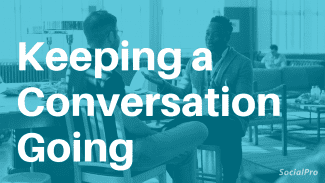

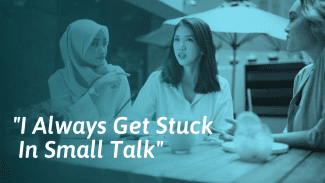




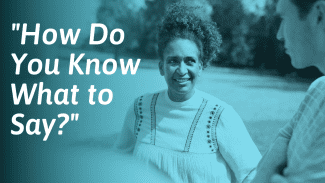
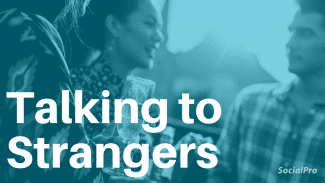
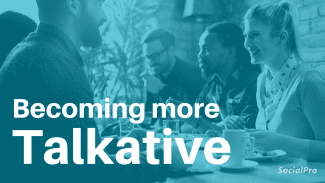


This article is very useful so thank you for your job !! Sometimes I don’t have any opportunity to see a person face-to-face or talk to a person via phone call so how do I make my texting conversation deep, long going and fascinating. It’s not always hard for me to keep a conversation ongoing in real life but it’s pretty challenging for me to do it when I text with someone. Can you help me with that, please! I assume it’s relatable for many people
How do you keep a conversation going especially when the two of you are not close. eg social media.
When talking to someone my voice becomes shaky, my heart beats fast and it’s hard for me to explain what I’m saying… how do I over this..
We have a guide on how to deal with nervosity over here: https://socialself.com/blog/how-to-never-be-nervous-around-people/
Hope it helps!
Thanks. these sentences are really helpful for me.
Hey you can help me
On snapchat what do you talk about
This article is very useful so thank you for your job !! Sometimes I don’t have any opportunity to see a person face-to-face or talk to a person via phone call so how do I make my texting conversation deep, long going and fascinating. It’s not always hard for me to keep a conversation ongoing in real life but it’s pretty challenging for me to do it when I text with someone. Can you help me with that, please! I assume it’s relatable for many people
Enjoyed this post but how can I overcome feeling stupid because people around us would be more interested in my limited attempts to speak a foreign language than joining the conversation
Thanks that was helpfull
Ideally, when you meet people, conversation and consequent bonding just happens, but what do you do when you’re stuck? For such situations, it is important to be aware of the ingredients that make a natural conversation flow and consciously use them when required. Great post!